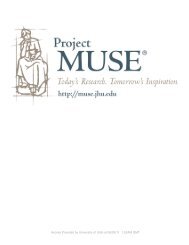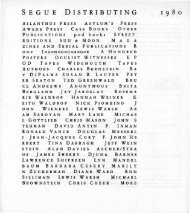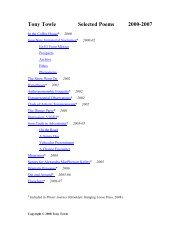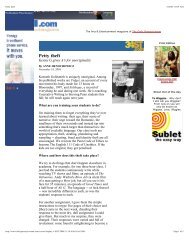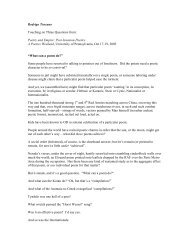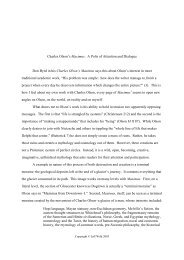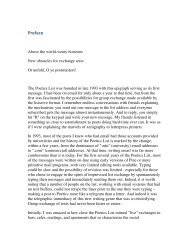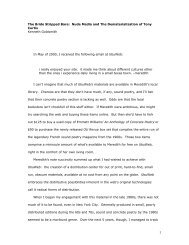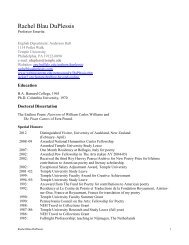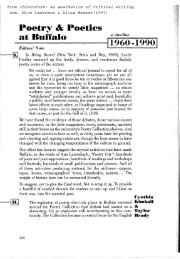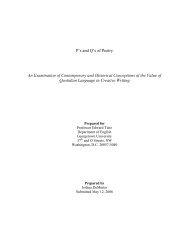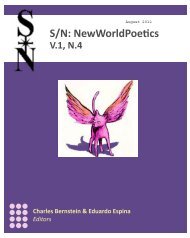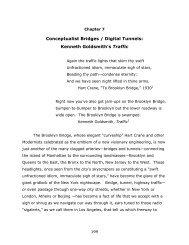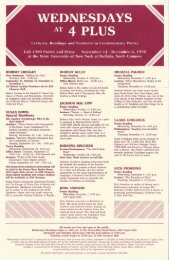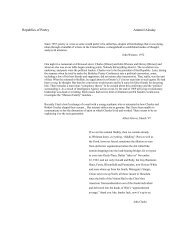'EASTER, 1916': YEATS'S FIRST WORLD WAR POEM
'EASTER, 1916': YEATS'S FIRST WORLD WAR POEM
'EASTER, 1916': YEATS'S FIRST WORLD WAR POEM
You also want an ePaper? Increase the reach of your titles
YUMPU automatically turns print PDFs into web optimized ePapers that Google loves.
FN:27<br />
FN:28<br />
FN:29<br />
FN:30<br />
238 marjorie perloff<br />
Tim Kendall chap12.tex V1 - October 4, 2006 1:50 P.M. Page 238<br />
Who can tell? And there is still another question on the poet’s mind: ‘what if excess<br />
of love / Bewildered them till they died?’ Here Yeats seems to be thinking of his<br />
own excessive love for Maud Gonne—a love that certainly clouded his judgement<br />
for years. In a similar sense, the rebels’ excess love for their cause, their fanaticism,<br />
may have ‘bewildered them’, hastening their noble but empty gesture and thus their<br />
death.<br />
‘O when may it suffice?’ Only after his fourth nervous, staccato question, does<br />
Yeats step back and memorialize the patriots, now for the first time naming them.<br />
The ending of ‘Easter, 1916’ has been justly praised for its drama: ‘I write it out<br />
in a verse’, the poet declares, paving the way for those famous but previously<br />
withheld names and the now thrilling repetition of the refrain, where ‘Pearse’<br />
rhymes so memorably with ‘verse’. What has been ‘born’ is indeed a ‘terrible<br />
beauty’—sublime, awful, irreconcilable, as critics on both the Left and the Right<br />
have frequently remarked. ‘The paradox of ‘‘Easter, 1916’’ ’, writes David Lloyd, ‘is<br />
that the achievement of such politically symbolic status, the transformation of lout<br />
or clown into martyr which brings about the foundation of the nation, is seen to<br />
produce not reconciliation but a troubled tension.’ 27 Or, in the words of Donald<br />
Davie:<br />
The most impressive thing about the whole poem is that the 1916 leaders are mourned most<br />
poignantly, and the sublimity of their gesture is celebrated most memorably, not when the<br />
poet is abasing himself before them, but when he implies that, all things considered, they<br />
were, not just in politics but in human terms, probably wrong. 28<br />
Here, then, is a poem commemorating a controversial revolutionary moment that<br />
satisfied readers of the most varying persuasions. Or almost: Maud Gonne did not<br />
like it. ‘My dear Willie’, she wrote on 8 November 1916, ‘No, I don’t like your<br />
poem, it isn’t worthy of you & above all it isn’t worthy of the subject . . . . you who<br />
have studied philosophy & know something of history know quite well that sacrifice<br />
has never yet turned a heart to stone though it has immortalized many & through<br />
it alone mankind can rise to God.’ And she goes on to praise MacDonagh and<br />
Pearse as ‘men of genius’, insisting that even ‘my husband’ (MacBride) ‘has entered<br />
Eternity by the great door of sacrifice which Christ opened and has therefore atoned<br />
for all’. 29 For Gonne, a great public poem, one that ‘our race would treasure &<br />
repeat’, must have a clear message, a clarion call to action. Perhaps this is why she<br />
herself was not capable of writing poetry, whereas Yeats understood that ‘We make<br />
out of the quarrel with others, rhetoric, but of the quarrel with ourselves, poetry.’ 30<br />
27 David Lloyd, ‘The Poetics of Politics: Yeats and the Founding of the State’, in Jonathan Allison<br />
(ed.), Yeats’s Political Identities: Selected Essays (Ann Arbor: University of Michigan Press, 1996), 393.<br />
28 Donald Davie, ‘ ‘‘Michael Robartes and the Dancer’’ ’, in Denis Donoghue and J. R. Mulryne<br />
(eds.), An Honoured Guest: New Essays on W. B. Yeats (New York: St Martin’s Press, 1966), 87.<br />
29 Gonne to Yeats, 8 Nov. 1916, in Gonne–Yeats Letters, 284–5.<br />
30 Yeats, ‘Per Amica Silentia Lunae’, in Mythologies (London: Macmillan, 1962), 331.



